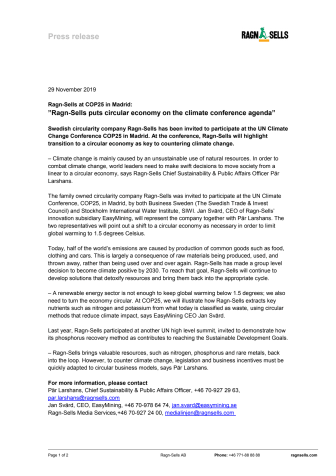Ragn-Sells puts circular economy on the climate conference agenda

Swedish circularity company Ragn-Sells has been invited to participate at the UN Climate Change Conference COP25 in Madrid. At the conference, Ragn-Sells will highlight transition to a circular economy as key to countering climate change.
– Climate change is mainly caused by an unsustainable use of natural resources. In order to combat climate change, world leaders need to make swift decisions to move society from a linear to a circular economy, says Ragn-Sells Chief Sustainability & Public Affairs Officer Pär Larshans.
The family owned circularity company Ragn-Sells was invited to participate at the UN Climate Conference, COP25, in Madrid, by both Business Sweden (The Swedish Trade & Invest Council) and Stockholm International Water Institute, SIWI. Jan Svärd, CEO of Ragn-Sells’ innovation subsidiary EasyMining, will represent the company together with Pär Larshans. The two representatives will point out a shift to a circular economy as necessary in order to limit global warming to 1.5 degrees Celsius.
Today, half of the world’s emissions are caused by production of common goods such as food, clothing and cars. This is largely a consequence of raw materials being produced, used, and thrown away, rather than being used over and over again. Ragn-Sells has made a group level decision to become climate positive by 2030. To reach that goal, Ragn-Sells will continue to develop solutions that detoxify resources and bring them back into the appropriate cycle.
– A renewable energy sector is not enough to keep global warming below 1.5 degrees; we also need to turn the economy circular. At COP25, we will illustrate how Ragn-Sells extracts key nutrients such as nitrogen and potassium from what today is classified as waste, using circular methods that reduce climate impact, says EasyMining CEO Jan Svärd.
Last year, Ragn-Sells participated at another UN high level summit, invited to demonstrate how its phosphorus recovery method as contributes to reaching the Sustainable Development Goals.
– Ragn-Sells brings valuable resources, such as nitrogen, phosphorus and rare metals, back into the loop. However, to counter climate change, legislation and business incentives must be quickly adapted to circular business models, says Pär Larshans.
For more information, please contact
Pär Larshans, Chief Sustainability & Public Affairs Officer, +46 70-927 29 63, par.larshans@ragnsells.com
Jan Svärd, CEO, EasyMining, +46 70-978 64 74, jan.svard@easymining.se
Ragn-Sells Media Services,+46 70-927 24 00, medialinjen@ragnsells.com
Fact Sheet: Circular Economy
In a circular economy, there is no waste, only resources. Products are designed to be taken apart, making it possible to recycle materials back to the loop. Consequently, all resources stay in the material cycle and retain their value over time.
According to the report ”Completing the picture” by Ellen MacArthur Foundation (available here), the conversion to renewable energy will only affect 55 percent of the world’s greenhouse gas emissions. The remaining 45 percent stem from agricultural and industrial production of goods and food. The report shows how shifting to a circular economy could eliminate a large proportion of these remaining emissions.
Fact Sheet: COP25
The UN Climate Change Conference (COP25) is held in Madrid, Spain, from 2 to 13 December, by the United Nations Framework Convention on Climate Change. During the conference, the 196 member countries will discuss the challenges caused by climate change. COP25 was originally planned to take place in Chile’s capital, Santiago, but the hosts pulled out due to political turmoil.
About Ragn-Sells Group
The Ragn-Sells Group is a privately held corporate group, operating companies in four countries.